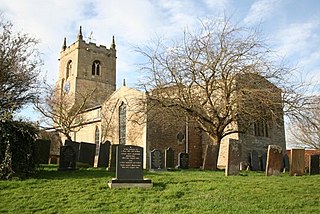
An eponym is a person, place, or thing after whom or which someone or something is, or is believed to be, named. The adjectives derived from eponym include eponymous and eponymic.

A farmer is a person engaged in agriculture, raising living organisms for food or raw materials. The term usually applies to people who do some combination of raising field crops, orchards, vineyards, poultry, or other livestock. A farmer might own the farmed land or might work as a laborer on land owned by others, but in advanced economies, a farmer is usually a farm owner, while employees of the farm are known as farm workers, or farmhands. However, in the not so distant past, a farmer was a person who promotes or improves the growth of by labor and attention, land or crops or raises animals.

A curate is a person who is invested with the care or cure (cura) of souls of a parish. In this sense, "curate" correctly means a parish priest; but in English-speaking countries the term curate is commonly used to describe clergy who are assistants to the parish priest. The duties or office of a curate are called a curacy.
A pastor, is the leader of a Christian congregation who also gives advice and counsel to people from the community or congregation. In Protestantism, a pastor may be ordained or not while in the Catholic Church and Orthodox Churches, the pastor is always an ordained priest. Pastors are to act like shepherds by caring for the flock, and this care includes teaching. The New Testament typically uses the words "bishops" and "presbyter" to indicate the ordained leadership in early Christianity. Likewise, Peter instructs these particular servants to "act like shepherds" as they "oversee" the flock of God. The words "bishop" and "presbyter" were sometimes used in an interchangeable way, such as in Titus 1:5-6. However, there is ongoing dispute between branches of Christianity over whether there are two ordained classes or three. In the Catholic Church, Orthodox Church, and Oriental Orthodox Church bishops, priests, and deacons are those who have been ordained with apostolic lineage. In most Protestant denominations and non-denominational churches, in contrast, bishops are rejected, as well as the doctrine of apostolic succession.

In historical legal systems, an outlaw is one declared as outside the protection of the law. In pre-modern societies, all legal protection was withdrawn from the criminal, so that anyone is legally empowered to persecute or kill them. Outlawry was thus one of the harshest penalties in the legal system. In early Germanic law, the death penalty is conspicuously absent, and outlawing is the most extreme punishment, presumably amounting to a death sentence in practice. The concept is known from Roman law, as the status of homo sacer, and persisted throughout the Middle Ages.
A badger was, in English, a term of uncertain derivation for a dealer in food or victuals which he had purchased in one place and carried for sale in another place. The Oxford English Dictionary gives the earliest entry as being from Bristol in 1500, but there were bager(s)gates at York in 1243 and in Lincoln by 1252. It continued in use until the 19th century in Great Britain.

A butcher is a person who may slaughter animals, dress their flesh, sell their meat, or participate within any combination of these three tasks. They may prepare standard cuts of meat and poultry for sale in retail or wholesale food establishments. A butcher may be employed by supermarkets, grocery stores, butcher shops and fish markets, slaughter houses, or may be self-employed.

A landlord is the owner of a house, apartment, condominium, land, or real estate which is rented or leased to an individual or business, who is called a tenant. When a juristic person is in this position, the term landlord is used. Other terms include lessor and owner. The term landlady may be used for female owners, and lessor may be used regardless of gender. The manager of a pub in the United Kingdom, strictly speaking a licensed victualler, is referred to as the landlord/lady.

Baba ghanoush, also spelled baba ganoush or baba ghanouj, is a Levantine appetizer of mashed cooked eggplant mixed with tahini, olive oil, possibly lemon juice, and various seasonings. It is of Lebanese origin. Traditionally, mutabbal is the condiment aforedescribed and baba ghanoush is more like a salad dip made with pomegranate molasses and olive oil, and often without tahini. It may be mixed with onions, tomatoes, or other vegetables.

Wainscott is a small village in Rochester, in Kent. It is in the civil parish of Frindsbury Extra, in the Medway Unitary Authority, that is Medway Council. By 1950 it had been absorbed into the neighbouring residential areas of Strood. Wainscott itself is located immediately next to Frindsbury, and is surrounded by beautiful agricultural land, as well as ancient woodlands. It is speculated that the name is derived from the OE meaning Wagonner Cot or Wagon Shed.

A deanery is an ecclesiastical entity in the Roman Catholic Church, the Eastern Orthodox Church, the Anglican Communion, the Evangelical Church in Germany, and the Church of Norway. A deanery is either the jurisdiction or residence of a dean.

A company, abbreviated as co., is a legal entity representing an association of people, whether natural, legal or a mixture of both, with a specific objective. Company members share a common purpose and unite to achieve specific, declared goals. Companies take various forms, such as:

Foston is a village and a civil parish in the South Kesteven district of Lincolnshire, England. The village is situated 5 miles (8 km) northwest of Grantham. The A1 road runs through the parish and borders the south of the village. The population of the civil parish at the 2011 census was 525.
Battel, or battels, sometimes spelled batells, is a term used in the University of Oxford to refer to food ordered by members of the college as distinct from the usual commons. Hence it also referred to college accounts for board and provisions supplied from kitchen and buttery, and, generally, the whole of a person's college accounts. Though the distinction from commons is no longer relevant, the term persists as the name for members' termly bills at many colleges at the Universities of Oxford and Durham.

In the Kingdom of England from the 12th to 15th centuries, a franklin was a member of a certain social class or rank. In the Middle English period, a franklin was simply a freeman; that is, a man who was not a serf. In the feudal system under which people were tied to land which they did not own, serfs were in bondage to a member of the nobility who owned that land. The surname "Fry", derived from the Old English "frig", indicates a similar social origin.

A foodie is a person who has an ardent or refined interest in food and who eats food not only out of hunger but due to their interest or hobby and is passionate about food. The terms "gastronome" and "gourmet" define the same thing, i.e. a person who enjoys food for pleasure.
Social justice warrior (SJW) is a pejorative term for an individual who promotes socially progressive views, including feminism, civil rights, and multiculturalism. The accusation that somebody is an SJW carries implications that they are pursuing personal validation rather than any deep-seated conviction, and engaging in disingenuous arguments.
Cecil Ernest Wells Charrington, MC, JP was an English brewing executive, who served for 26 years as Chairman of Charrington and Co. and was twice President of the Institute of Brewing.
Mary Ann Ashford (1787–1870) was an English cook. She published her memoirs, an account of her life as a domestic servant, Life of a Licensed Victualler's Daughter, which was published in 1844.











